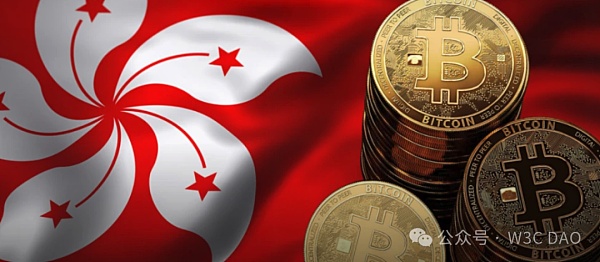Rising in the East and Falling in the West
According to the Shanghai Securities News on May 1, the first batch of spot cryptocurrency ETFs under China Asset Management (Hong Kong), Bosera Funds (International), and Harvest Global Asset Management officially landed on the Hong Kong Stock Exchange.
Overall, the first batch of spot cryptocurrency ETFs performed actively on the first day, with a transaction amount of more than HK$87 million.
Reporters learned from channel sources that China Asset Management (Hong Kong) has a strong momentum in issuance. On the first day of issuance, China Asset Management Bitcoin ETF and China Asset Management Ethereum ETF raised more than HK$1.1 billion, exceeding the first-day fundraising scale of the US Bitcoin ETF. Adding the total fundraising of the other two institutions, the fundraising scale of the first batch of cryptocurrency ETFs is about HK$2 billion.

Analysts believe that Hong Kong investors have shown great interest in virtual assets. As the virtual asset infrastructure and ecosystem continue to improve, the asset management scale of cryptocurrency ETFs is expected to expand significantly.
The first day of issuance of 10 Bitcoin spot ETF issuers in the United States on January 10 this year was US$125 million (approximately HK$978 million). "The fundraising scale of the first batch of spot cryptocurrency ETFs in Hong Kong far exceeds that of the first batch of products in the United States."
As a new channel for "old money" to enter the virtual asset industry, ETFs are expected to attract more traditional investors to enter the virtual asset market. At the same time, due to the support of physical subscription and redemption, Bitcoin and Ethereum spot ETFs are expected to bring in more Web3 people, which will also promote the overall growth of the market size.
In contrast, according to Tree News, the U.S. spot Bitcoin ETF had a net outflow of $559.5 million on that day.
BlackRock IBIT had a net outflow of $36.9 million on that day, the first time it had a single-day net outflow; Fidelity FBTC had a net outflow of $191.1 million, a net outflow for five consecutive trading days.
It can be said that before and after the Bitcoin halving, the U.S. market "suddenly" became deserted. First, the market funding rate dropped rapidly, and U.S. long positions were greatly reduced. Then, the inflow of funds into ETFs decreased significantly, and even began to flow out, but funds from Hong Kong were flowing in.
Battle of the East and the West
According to previous reports by PANews, the three fund companies in Hong Kong are competing fiercely in terms of management fees. Harvest International's products are exempted from management fees within 6 months of holding, and Bosera International's products are exempted from management fees within 4 months after issuance. The management fees of the three funds are 30 basis points (Harvest International), 60 basis points (Bosera International) and 99 basis points (Huaxia Fund) respectively.
In addition, on April 30, according to an official tweet from HashKey, non-Hong Kong residents can also subscribe to or purchase Bosera HashKey Bitcoin and Ethereum spot ETF products if they meet local regulatory requirements (such as passing customer due diligence).

Another difference from US cryptocurrency ETFs is that Hong Kong's ETFs use the so-called "physical subscription and redemption" mechanism, allowing investors to buy and sell ETF shares using relevant cryptocurrency tokens rather than cash. This option should be attractive to investors, as token holders "may consider the benefits of holding tokens through ETFs without having to convert to fiat currency first." Weng Xiaoqi said that for traditional people, they can seize this round of strong virtual asset bull market represented by BTC and ETH through the capital channel and asset structure advantages of ETFs to realize asset appreciation. For Web3 native users, buying spot ETFs is essentially a kind of "TradFi mining", "digging" into the value and potential of traditional markets and assets. For example, users who already hold BTC and ETH in Hong Kong can turn the original "alternative assets" into "mainstream assets" through IN-Kind (physical), which can attract more Web3 native people to stay in Hong Kong better. However, according to Tencent's "Qianwang", not many investors have made physical subscriptions through Shengli Securities in the past few days. There are also some original investors in the currency circle who did not rush to deposit funds and place orders after opening an account at Shengli Securities. In addition, the current physical subscription and redemption of Shengli Securities is still not convenient enough by placing orders and confirming by email or phone. It is expected that all parties will further run-in in terms of processes and customer docking in the next stage.
Although the gap between the first-day trading volume and the United States was expected, as the head of a Hong Kong institution commented: "The issuance of BTC and ETH spot ETFs in Hong Kong is a challenge to regain the pricing power of crypto assets. The result is second, and the position is first. ”
Huaxia Fund (Hong Kong) Digital Asset Management Director Zhu Haokang said that the launch "will enhance Hong Kong's competitiveness as an international financial center."

Weng Xiaoqi also believes that the significance of the launch of Hong Kong spot ETFs is not limited to the ETFs themselves. ETFs are more of a symbolic significance, meaning that traditional financial institutions fully embrace virtual assets, and triggering a large number of institutions to enter the market is the highlight. In the future, more Chinese and foreign fund companies are expected to enter the market to issue ETFs.
"There is a bigger game going on here: the launch of these new ETFs puts Hong Kong ahead of Singapore and Dubai, which are also trying to establish themselves as regulatory centers for digital assets. "As Antoni Trenchev, co-founder of the cryptocurrency exchange Nexo, said to the outside world.
A new game has begun, and Hong Kong has taken the lead. The final outcome remains to be seen.
Written at the end
In the current environment, the United States and Hong Kong have become two important markets for Bitcoin ETFs, each representing the unique positions and strategies of the West and the East.
It can be said that in the competition between the United States and Hong Kong for Bitcoin ETFs, the different perspectives and interests of the East and the West in the field of virtual assets have been demonstrated, which has also had an impact on the future direction and development of Bitcoin.
But no matter what, the launch and development of Bitcoin ETFs is both an opportunity and a challenge for Bitcoin, which requires the joint attention and response of investors and regulators.
 Huang Bo
Huang Bo
 Huang Bo
Huang Bo JinseFinance
JinseFinance JinseFinance
JinseFinance JinseFinance
JinseFinance Edmund
Edmund JinseFinance
JinseFinance JinseFinance
JinseFinance Alex
Alex Finbold
Finbold Bitcoinist
Bitcoinist